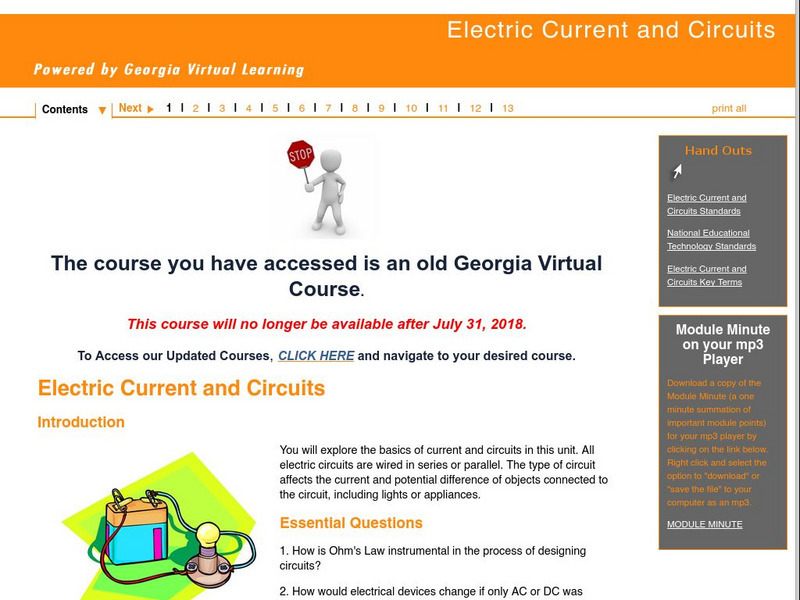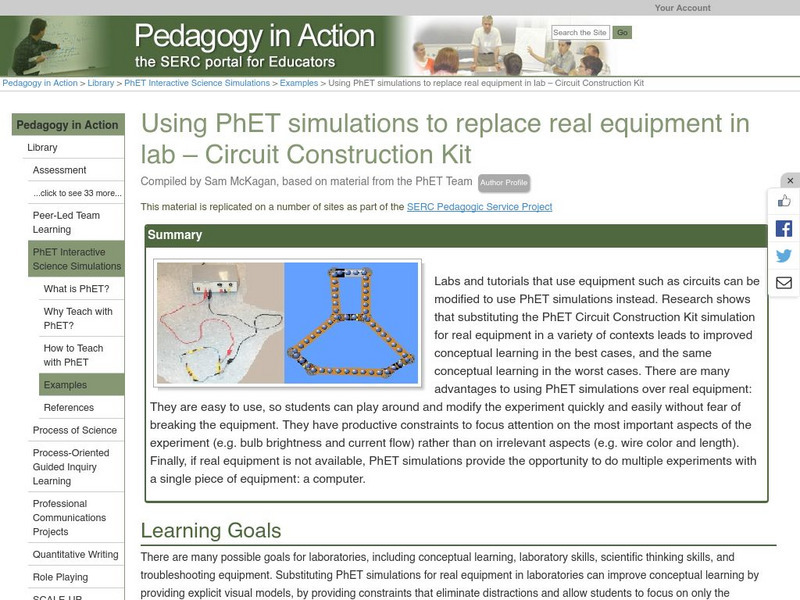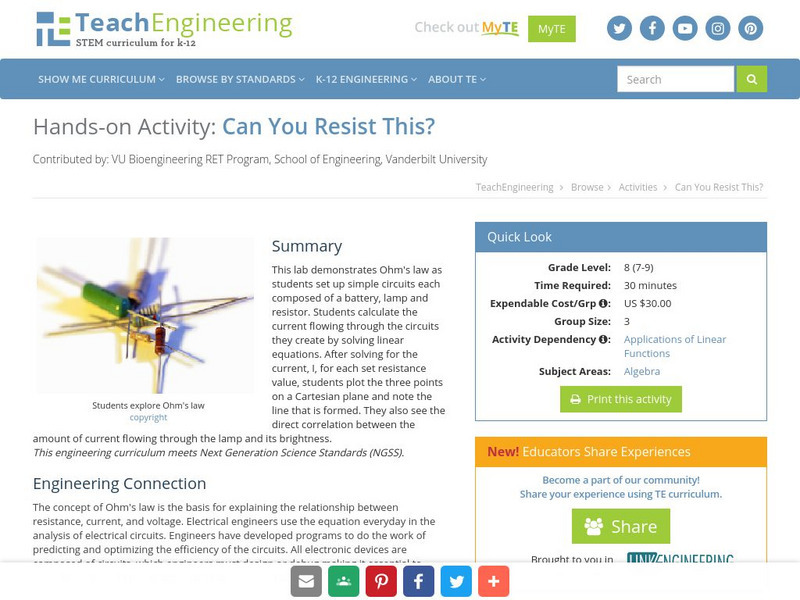Curated OER
Radius, Diameter and Area
Students identify the radius and diameter of a circle. In this geometry lesson, students calculate the volume and area of a cylinder and circle. They relate the circumference of a circle to Pi.
Curated OER
Unit Circle and Triangle
Students apply the Unit Circle to solve ratios of triangles. In this geometry lesson, students derive the different ratios of a triangle using the Pythagorean Theorem. They find the angles of a unit circle using a right triangle.
Georgia Department of Education
Ga Virtual Learning: Electric Current and Circuits
Students have the opportunity to explore the basics of current and circuits in this online module. Some of the activities include interactive animations, informational text, practice problems, and lab experiments.
CK-12 Foundation
Ck 12: Electric Current
[Free Registration/Login may be required to access all resource tools.] The definition of electric current is explained and how to calculate an electric current. Includes links to resources for learning more about electricity, i.e., a...
Physics Aviary
Physics Aviary: Induced Current Lab
This lab was designed to have students test the factors that determine how much current is induced in a circuit when area of the circuit is changed. This lab is a quantitive lab that supplements the lab on magnetic flux.
Smithsonian Institution
Lemelson Center: Spark!lab: Make a Light Bulb
This lab shows students how to make a light bulb using 6V battery, wire, cork, and a nail. Print a form where you can record your results.
Science Education Resource Center at Carleton College
Serc: Ph Et Simulations: Replace Real Equipment in Lab Circuit Construction Kit
Students explore with a PhET interactive simulation to replicate the construction of electrical circuits.
National High Magnetic Field Laboratory
Magnet Academy: Current Flow
This tutorial illustrates how the flow of water through a system of pipes can be used to understand the flow of current through an electric circuit.
National High Magnetic Field Laboratory
Magnet Academy: Alternating Current
Alternating current behaves differently, depending on what components are in a circuit.
National High Magnetic Field Laboratory
Magnet Academy: Wilhelm Weber
Find out more about German physicist Wilhelm Weber, who developed and enhanced a variety of devices for sensitively detecting and measuring magnetic fields and electrical currents.
National High Magnetic Field Laboratory
Magnet Academy: Timeline of Electricity and Magnetism: 1820 1829
Hans Christian Orsted's accidental discovery that an electrical current moves a compass needle rocks the scientific world; a spate of experiments follows, immediately leading to the first electromagnet and electric motor.
University of Illinois
University of Illinois Urbana Champaign: Chemistry Learning Center: Electrolysis of Water Using an Electrical Current
From the Chemistry Learning Center at the University of Illinois, this page explains the chemical changes occurring during a water electrolysis lab. Textual information is accompanied by photographs which clearly illustrate the changes.
Physics Aviary
Physics Aviary: Simple Circuit Lab
This lab is designed to have students investigate the relationships between voltage, resistance and current in a circuit with only one passive component. The batteries in this simulation can be varied from ideal batteries to batteries...
Physics Aviary
Physics Aviary: Magnetic Induction Lab
This lab was designed to have students test the things that can induce a current in a coil of wires. This lab is a purely quantitative lab.
National High Magnetic Field Laboratory
Magnet Academy: Wheatstone Bridge
This circuit is most commonly used to determine the value of an unknown resistance to an electrical current.
Physics Aviary
Physics Aviary: Rc in Ac Lab
This lab was designed to help students understand the difference between circuits powered by DC and circuits powered by AC. Students can see that simple changes in frequency lead to changes in the potential difference across the...
Physics Aviary
Physics Aviary: Rail Gun Lab
This lab was designed to have students test the factors that affect the acceleration of a metal bar that is carrying a current through a magnetic field.
Physics Aviary
Physics Aviary: Rl in Ac Lab
This lab was designed to help students understand the difference between circuits powered by DC and circuits powered by AC. Students can see that simple changes in frequency lead to changes in the potential difference across the...
TeachEngineering
Teach Engineering: Can You Resist This?
This lab demonstrates Ohm's law as students set up simple circuits each composed of a battery, lamp and resistor. Students calculate the current flowing through the circuits they create by solving linear equations. After solving for the...
National High Magnetic Field Laboratory
Magnet Academy: William Crookes
English scientist William Crookes was very innovative in his investigations with vacuum tubes and designed a variety of different types to be used in his experimental work. Crookes tubes are glass vacuum chambers that contain a positive...
National High Magnetic Field Laboratory
Magnet Academy: Timeline of Electricity and Magnetism: 1880 1889
Nikola Tesla and Thomas Edison duke it out over the best way to transmit electricity and Heinrich Hertz is the first person (unbeknownst to him) to broadcast and receive radio waves.
Physics Aviary
Physics Aviary: Series Circuit Lab
This lab is designed to have students investigate the relationships between voltage, resistance and current in a series circuit with up to three passive components. The batteries in this simulation can be varied from ideal batteries to...
National High Magnetic Field Laboratory
Magnet Academy: Induced Current
A current can be induced in a conducting loop if it is exposed to a changing magnetic field. (Java tutorial)
National High Magnetic Field Laboratory
Magnet Academy: Transmission Lines
Electricity goes through some ups and downs on its way from the power plant to your house. See how it works in this interactive activity.















